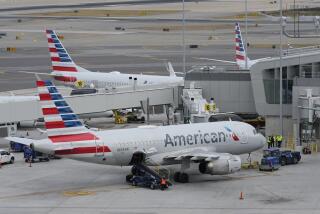Beware of Special Charges When Exchanging Travelers’ Checks
- Share via
Banks may soon join many airport-based money changers in levying a service charge for cashing travelers’ checks.
“Operating outlets at airports is expensive, particularly when these offices are open 24 hours,” one bank official said in defending the fee.
Fee policies vary. For example, there may be a single charge for any amount of checks cashed or the charge may be based on the number or amount of checks. Or additional charges may be levied, per check, after a certain amount has been surpassed. A sign may or may not be posted explaining the fees.
But don’t despair. There are ways to minimize fees.
When exchanging travelers’ checks for money, sometimes it is helpful to take your checks to a bank or financial outlet working with the issuer. This may may help you avoid a service charge, although some banks levy fees regardless of which financial institution issued the checks.
Exchanging traveler’s checks at a hotel may be convenient and may help you avoid a service charge, but the rate of exchange may not be as good as at banks and other outlets. Calculate various rates before transacting an exchange.
Initial Exchange
Exchanging a few travelers’ checks at an airport when you arrive in a country may be convenient, but this can result in having to pay a service charge. Charges will vary from airport to airport.
At a currency-exchange office in the Amsterdam airport, I was quoted a surcharge of 5 guilders, about $2.50 U.S., for cashing travelers’ checks, plus 10 Dutch cents per check.
At the Helsinki airport, the assessment was 20 marks, about $5 U.S., for five traveler’s checks, and 4 marks per check thereafter. No signs explained the service charges.
At the Auckland airport, the surcharge was $3 New Zealand, about $1.83 U.S., after the checks reached $30 New Zealand. This amount was reached with the conversion of a single $20 travelers’ check. There was no sign indicating the $30 level.
At a smaller airport at Hokitika in New Zealand, there was only a 5-cent N.Z. charge per check for conversion.
Generally, the greater the number of exchanges, the higher the fees that are charged. As a result, there may be an advantage to exchanging more, rather than less, checks per transaction.
Check with the company that issued your travelers’ checks to find out which banks at your destinations will cash the checks without a service fee.
At some foreign banks, you may be able to get money with your credit card. Or you can obtain foreign currency before you leave the United States. But you may have to pay a service charge for this currency and the exchange rates may be different from those abroad.
Other Options
Another option is to buy travelers’ checks in foreign currencies. There is no additional service fee for such checks. If you’re going to spend a lot of time in a country, this usually makes sense.
Although you won’t be able to hunt around for the best exchange rate, you will have a hedge against the dollar dropping. Of course, if the dollar goes up, you lose out on the currency fluctuation.
If you don’t know how long you will be visiting a country or the trip is to be short, you’re probably better off buying travelers’ checks in domestic currency. Some institutions may not levy a charge to reconvert U.S. travelers’ checks back to dollars, while you may be charged a service fee to cash foreign-currency travelers’ checks for U.S. dollars.
And if changing foreign-currency checks back to U.S. currency, you may get a better rate of exchange by having them changed to travelers’ checks rather than cash. This is because it costs banks less to transport and insure travelers’ checks than cash.
While comparison shopping exchange rates at various banks may save you a dollar or two, unless you are exchanging a great deal of money, the time you spend shopping may not be worth the money you save.
Before exchanging money, calculate the amount of money you should get back. Keep a record of your expenditures as well as a receipt for all transactions.
And avoid black-market operators. Although the rate of exchange may seem inviting, such transactions are illegal in most countries. The authorities themselves may pose as black-market operators. It’s a risky proposition.
More to Read
Sign up for The Wild
We’ll help you find the best places to hike, bike and run, as well as the perfect silent spots for meditation and yoga.
You may occasionally receive promotional content from the Los Angeles Times.






